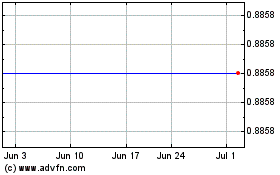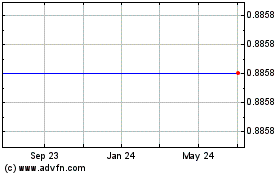Credit Suisse CEO Tidjane Thiam Awarded $10 Million as Strategic Shift Starts to Pays Off -- Update
March 23 2018 - 6:34AM
Dow Jones News
By Brian Blackstone
ZURICH -- Credit Suisse Group AG Chief Executive Tidjane Thiam
was awarded 9.7 million Swiss francs ($10.2 million) in
compensation for 2017, as his strategic shift toward managing money
for wealthy clients showed signs of paying off despite the bank
posting a third-straight annual loss.
Total compensation for the bank's 12-member executive board came
in at 69.9 million francs last year, down about three million
francs from 2016, while the total bonus pool was 3.19 billion
francs, up 3% from 2016.
Banker pay has been a controversial topic globally since the
financial crisis one decade ago. In recent years, it has been
particularly thorny for Credit Suisse as the Swiss banking giant
underwent deep, and costly, changes that made it hard to define
success.
After a rocky 2015 and 2016, last year was one of relative calm.
The bank's strategic shift toward wealth management -- while
maintaining a streamlined investment banking unit -- proceeded
without big disruptions and it didn't have costly litigation. Its
share price, which briefly fell below 10 francs a share in
mid-2016, rose by 20% in 2017.
So far in 2018, Credit Suisse shares are down about 8%, trading
Friday above 16 francs.
Mr. Thiam's pay for 2017 was down about 5% from 10.2 million
francs the previous year, reflecting his decision a year ago to
give up a portion of his long-term incentive bonus. At the time,
the board of directors had proposed a pay package of 11.9 million
francs for Mr. Thiam. But facing a backlash from shareholders, Mr.
Thiam and other executive board members said they would accept a
40% reduction in their short-term incentives awards for 2016 and
long-term incentives for 2017.
Credit Suisse hasn't turned an annual profit since Mr. Thiam
took over as chief executive in the middle of 2015. The loss in
2015 was prompted by impairment charges as it scaled back its
investment banking business, part of a broader strategic overhaul.
In the wake of those results, Mr. Thiam asked that his bonus be
reduced
The bank lost 2.7 billion francs in 2016 after reaching a
settlement worth about $5.3 billion with the U.S. Justice
Department related to mortgage securities sold before the financial
crisis -- long before Mr. Thiam joined the firm.
Last year, it was an accounting adjustment that drove Credit
Suisse to a loss of 983 million francs. It had to write down more
than $2 billion in deferred tax assets because of U.S. tax reform
legislation that was signed into law in late 2017. Many other
banks, including Credit Suisse's crosstown rival UBS Group AG, had
to do the same.
At a press conference last month for the bank's annual results,
Mr. Thiam made it clear that his bonus shouldn't be influenced by
the tax-related accounting charge.
"You're asking me because Mr. Trump decided to sign the U.S. tax
cut and jobs act on Dec. 22, and not Jan. 1, which means that the
bonuses should be cut? Because if he would have signed it Jan. 1 we
would have had a 1.8 billion [franc] profit," he said. "So I don't
think the board is going to take that view."
Nevertheless, the overall bonus pool figure disclosed Friday was
reduced by 100 million francs because of the effect of the
tax-related loss. The compensation report noted the tax charge was
"outside of the control of management and had minimal impact on
capital, liquidity, our ability to pay dividends or our underlying
results."
The bank also proposed long-term incentives for the executive
board this year that could total a maximum 58.5 million francs if
the bank achieves certain targets related to shareholder value and
return on tangible equity over a three-year period.
Write to Brian Blackstone at brian.blackstone@wsj.com
(END) Dow Jones Newswires
March 23, 2018 06:19 ET (10:19 GMT)
Copyright (c) 2018 Dow Jones & Company, Inc.
Credit Suisse (NYSE:CS)
Historical Stock Chart
From Mar 2024 to Apr 2024

Credit Suisse (NYSE:CS)
Historical Stock Chart
From Apr 2023 to Apr 2024
